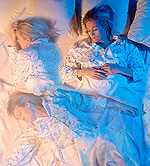 |
 |
 |
||
    |
||||
|
||||

Common Drug Eases Restless Legs Syndrome
Lyrica also improves quality of sleep for patients, study finds|
|
HealthDay
Wednesday, April 29, 2009
 WEDNESDAY, April 29 (HealthDay News) -- Lyrica, a drug used to treat epilepsy, nerve pain, anxiety and fibromyalgia, shows promise in easing the symptoms of restless legs syndrome, a Spanish researcher reports.
WEDNESDAY, April 29 (HealthDay News) -- Lyrica, a drug used to treat epilepsy, nerve pain, anxiety and fibromyalgia, shows promise in easing the symptoms of restless legs syndrome, a Spanish researcher reports.
Some 5 percent to 10 percent of adults in the United States have restless legs syndrome (RLS), a disorder that causes people to feel a compelling need to move their legs, especially while lying down. The condition can have a substantial impact on sleep, daily activities and quality of life, researchers say.
"This is the first time this drug is being tried for RLS," said Dr. Diego Garcia-Borreguero, director of the Sleep Research Institute in Madrid. "Pregabalin [Lyrica] is an effective drug for the treatment of RLS -- it leads about 60 percent of patients into clinical remission."
The drug improves both the sensation and motor symptoms of RLS, Garcia-Borreguero said.
He also noted that patients taking Lyrica had improved quality of sleep. "Other drugs for RLS had not been able to solve this problem," he said. "They have not been able to improve sleep."
This use of Lyrica is an off-label one, Garcia-Borreguero cautioned.
The findings were to be presented Wednesday at the American Academy of Neurology's annual meeting, in Seattle.
For the study, Garcia-Borreguero randomly assigned 58 people with RLS to Lyrica or a placebo. Sleep studies were performed at the beginning and end of the 12-week trial.
Garcia-Borreguero found that almost 75 percent of patients taking Lyrica had RLS symptoms stop while taking the drug. Among those who continued to have RLS, their symptoms improved by 66 percent. Patients on placebo saw their symptoms worsen by 29 percent.
In addition, those taking Lyrica had better sleep compared with patients taking placebo. Patients on Lyrica had more slow-wave sleep, or deep sleep. They also spent less time in the lighter sleep stages compared with people taking placebo, Garcia-Borreguero said.
RLS presents as an urge to move the legs, often with unpleasant numbness, tingling or burning sensations. These symptoms increase during rest and are partially relieved through activity. Symptoms worsen at night and tend to progress with age.
The study was funded by Pfizer Inc., the maker of Lyrica.
Dr. Carlos Singer, director of the Movement Disorders Center at the University of Miami School of Medicine, thinks Lyrica provides an alternative to other drugs for RLS and may also have fewer side effects.
"You have another weapon to treat RLS," Singer said. "This drug, to the best of my knowledge, has a very safe record," he said. "I would definitely try it with patients."
Singer noted that more studies are needed to see if the drug is still effective for RLS after long-term use.
HealthDay
Copyright (c) 2009 ScoutNews, LLC. All rights reserved.
Related News:
More News on this Date
Related MedlinePlus Pages:
| Home | Health Topics | Drugs & Supplements | Encyclopedia | Dictionary | News | Directories | Other Resources | |
| Disclaimers | Copyright | Privacy | Accessibility | Quality Guidelines U.S. National Library of Medicine, 8600 Rockville Pike, Bethesda, MD 20894 National Institutes of Health | Department of Health & Human Services |
Date last updated: 30 April 2009 |
